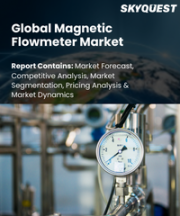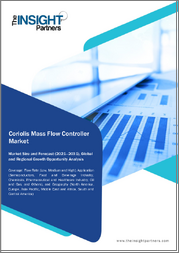
|
시장보고서
상품코드
1807638
유량계 시장 : 제품 유형, 유체 유형, 설치, 통신, 신호 유형, 용도, 유통 채널별 - 세계 예측(2025-2030년)Flow Meters Market by Product, Fluid Type, Installation, Communication, Signal Type, Application, Distribution Channel - Global Forecast 2025-2030 |
||||||
유량계 시장은 2024년에는 93억 5,000만 달러로 평가되었습니다. 2025년에 99억 2,000만 달러에 이르고, CAGR 6.38%로 성장하여 2030년에는 135억 5,000만 달러에 달할 것으로 예측됩니다.
| 주요 시장 통계 | |
|---|---|
| 기준 연도 : 2024년 | 93억 5,000만 달러 |
| 추정 연도 : 2025년 | 99억 2,000만 달러 |
| 예측 연도 : 2030년 | 135억 5,000만 달러 |
| CAGR(%) | 6.38% |
효율성과 혁신을 촉진하는 세계 산업 변화 속에서 유량계 기술의 역동적인 진화의 발판을 마련합니다.
유량계 기술은 석유 및 가스, 수처리, 제약, 화학 등의 중요한 공정을 지원하며 다양한 산업에서 필수 불가결한 요소로 자리 잡았습니다. 최근 센서 기술, 디지털 통신 프로토콜 및 데이터 분석의 발전으로 인해 이러한 장비는 단순한 측정 장치에서 복잡한 자동화 아키텍처의 지능형 노드로 승화되었습니다. 전 세계적으로 산업 활동이 가속화됨에 따라 자원 활용의 최적화, 엄격한 규제 기준 준수, 공정 안전성 향상 등의 목표에 따라 정밀 유량 측정 솔루션에 대한 수요가 증가하고 있습니다.
디지털화, 지속가능성, 운영 탄력성을 통해 유량계 솔루션을 재정의하는 전례 없는 기술 및 시장 변화
디지털화와 지속가능성이 융합되고 제품 설계와 응용의 틀이 재구성되면서 유량계의 상황은 크게 변화하고 있습니다. 스마트 유량계는 현재 임베디드 분석을 통합하여 과거에는 고급 공정 제어 시스템의 영역이었던 실시간 이상 감지 및 예지보전 기능을 가능하게 하고 있습니다. 커넥티드 계측으로의 전환은 자산 성능 관리를 가속화하고, 계획되지 않은 다운타임을 최소화하며, 새로운 서비스 기반 수익 모델을 창출할 수 있습니다.
2025년 미국 관세 조정이 유량계 공급망, 비용 구조, 경쟁에 미치는 영향에 대해 알아봅니다.
미국의 2025년 관세 조정은 세계 유량계 공급망에 새로운 복잡성을 가져왔습니다. 일부 전자부품 및 특수 합금에 대한 수입관세 인상으로 제조비용이 상승하면서 많은 업체들이 조달전략을 재검토하고 있습니다. 이에 따라 일부 대형 제조업체들은 공급업체 기반 다변화, 니어쇼어링 가속화, 관세 변동에 대한 노출을 줄이기 위해 장기 계약 협상을 시작했습니다.
유량계 시장의 제품, 유체, 설치, 통신, 신호, 용도, 유통 경로 등 다양한 측면에 대한 중요한 통찰력을 제공합니다.
시장 세분화에 대한 미묘한 이해는 잠재력이 높은 틈새 시장을 파악하고 전략적 이니셔티브를 조정하는 데 필수적입니다. 제품 유형별로는 코리올리식 질량 유량계가 뛰어난 정확도와 다중 파라미터 측정 기능을 필요로 하는 용도에서 우위를 점하고 있습니다. 차압계는 소용돌이 및 터빈 기술이 특수 응용 분야에서 다시 관련성을 찾고 있지만, 전통적인 공정 산업에서 우위를 유지하고 있습니다. 자기식 계측기는 전도성 유체에서 우수하고, 용적식 계측기는 점성 액체에서 신뢰할 수 있는 성능을 발휘합니다.
미주, 유럽, 중동 및 아프리카, 아시아태평양 시장 역학 및 시장 성장 촉진요인에 대한 비교 분석
북미와 남미 시장 역학은 기존 인프라의 현대화와 스마트 미터링 네트워크의 통합을 중시하는 성숙한 산업 기반이 특징입니다. 북미에서는 파이프라인 안전, 물 관리, 디지털 유전 이니셔티브에 대한 투자가 고성능 유량계에 대한 수요를 지속적으로 뒷받침하고 있으며, 무선 표준의 점진적인 도입으로 원격 제어 개보수 프로그램이 가속화되고 있습니다.
R&D, 전략적 파트너십, 부가가치 서비스를 통해 시장 차별화를 주도하는 주요 유량계 제조업체 및 혁신가 프로파일링
주요 유량계 기업들은 타겟팅된 혁신과 전략적 제휴를 통해 차별화를 지속하고 있습니다. 기존 산업 자동화 공급업체들은 센서의 정확도, 디지털 인터페이스, 사이버 보안 기능을 개선하기 위해 대규모 R&D 예산을 활용하고 있습니다. 동시에, 전문 제조업체는 열악한 환경 응용 분야에 대응하기 위해 첨단 재료 공학에 투자하여 해상 석유 플랫폼 및 화학 처리 플랜트에서 프로젝트를 수주했습니다.
새로운 유량계 기술을 활용하여 운영을 최적화하고 시장 경쟁력을 강화하기 위해 업계 리더들에게 실행 가능한 전략적인 제안을 제공합니다.
업계 리더는 유량계 데이터를 전사적 자산 관리 플랫폼에 통합하여 사전 예방적 유지보수 및 운영 우수성을 이끌어내는 것을 우선순위로 삼아야 합니다. 엣지 컴퓨팅 아키텍처를 채택함으로써 기업은 중요한 측정 데이터를 실시간으로 처리하고, 대기 시간을 줄여 의사 결정의 민첩성을 향상시킬 수 있습니다. 또한, LoRaWAN 및 NB-IoT와 같은 무선 통신 표준에 투자함으로써 그린필드 사이트와 브라운필드 사이트 모두에서 확장 가능한 배포를 지원합니다.
엄격한 데이터 수집, 정성적 분석 및 검증 프로세스를 통한 종합적인 조사 방법을 통해 강력한 유량계 시장 인사이트를 제공합니다.
본 조사는 주요 이해관계자와의 1차 인터뷰, 심층적인 2차 조사, 엄격한 검증 프로토콜을 결합한 혼합 방법론 접근법을 채택했습니다. 다양한 최종 사용자 업계의 수석 엔지니어, 조달 임원, 용도 전문가들과의 구조화된 토론을 통해 1차적인 통찰력을 수집했습니다. 이러한 질적 입력은 관세 일정, 자재 비용, 규제 요건에 대한 자체 데이터에 의해 강화되었습니다.
빠르게 변화하는 세계 정세 속에서 유량계 산업의 미래 궤적을 그리기 위한 주요 발견과 전략적 중요 사항의 통합.
기술의 비약적인 발전과 지속가능성 의무화, 지정학적 변화, 진화하는 비즈니스 모델 등 다양한 힘을 종합하면 유량계 산업은 매우 중요한 기로에 서 있습니다. 정밀 측정 솔루션은 더 이상 보조적인 구성요소가 아니라 효율성, 안전성, 디지털 혁신의 기반이 되고 있습니다. 관세율의 변화, 지역적 우선순위의 변화 속에서 민첩성과 전략적 선견지명이 가장 중요해집니다.
목차
제1장 서문
제2장 조사 방법
제3장 주요 요약
제4장 시장 개요
제5장 시장 역학
제6장 시장 인사이트
- Porter's Five Forces 분석
- PESTEL 분석
제7장 미국 관세의 누적 영향 2025
제8장 유량계 시장 : 제품별
- 코리올리 질량 유량계
- 차압(DP) 유량계
- 마그네틱 유량계
- 용적식(PD) 유량계
- 터빈 유량계
- 초음파 유량계
- 와류 유량계
제9장 유량계 시장 : 유체 유형별
- 가스
- 액체
- 스팀
제10장 유량계 시장 : 설치별
- Clamp On
- Inline
- Insertion
제11장 유량계 시장 : 통신별
- 유선
- 무선
- BLE/Wi-Fi
- LoRaWAN
- NB-IoT
- WirelessHART
제12장 유량계 시장 : 신호 유형별
- 아날로그
- 디지털
제13장 유량계 시장 : 용도별
- 항공우주 및 방위
- 화학제품
- 식품 및 음료
- HVAC 및 빌딩 서비스
- 해양
- 금속 및 광업
- 석유 및 가스
- 의약품
- 발전
- 수력발전
- 핵
- 재생
- 서멀
- 펄프 및 종이
- 반도체
- 물 및 폐수
- 분포
- 누출 검출
제14장 유량계 시장 : 유통 채널별
- 오프라인
- 온라인
제15장 아메리카의 유량계 시장
- 미국
- 캐나다
- 멕시코
- 브라질
- 아르헨티나
제16장 유럽, 중동 및 아프리카의 유량계 시장
- 영국
- 독일
- 프랑스
- 러시아
- 이탈리아
- 스페인
- 아랍에미리트(UAE)
- 사우디아라비아
- 남아프리카공화국
- 덴마크
- 네덜란드
- 카타르
- 핀란드
- 스웨덴
- 나이지리아
- 이집트
- 튀르키예
- 이스라엘
- 노르웨이
- 폴란드
- 스위스
제17장 아시아태평양의 유량계 시장
- 중국
- 인도
- 일본
- 호주
- 한국
- 인도네시아
- 태국
- 필리핀
- 말레이시아
- 싱가포르
- 베트남
- 대만
제18장 경쟁 구도
- 시장 점유율 분석, 2024년
- FPNV 포지셔닝 매트릭스, 2024년
- 경쟁 분석
- ABB Ltd.
- Azbil Corporation
- Badger Meter, Inc.
- Baker Hughes Company
- BR Instrumentation & Controls
- Bronkhorst High-Tech B.V.
- Brooks Instrument, LLC
- Emerson Electric Co.
- Endress+Hauser AG
- Fuji Electric Co., Ltd.
- General Electric Company
- Hitachi, Ltd.
- Honeywell International Inc.
- Katronic Technologies Ltd.
- KEM Kuppers Elektromechanik GmbH
- KROHNE Messtechnik GmbH
- Manas Microsystems Private Limited
- Max Machinery, Inc.
- Omega Engineering, Inc.
- Parker Hannifin Corporation
- Peltek India
- PSG by Dover Corporation
- Schneider Electric SE
- ONICON Incorporated
- Rockwell Automation, Inc.
- Sick AG
- Siemens AG
- SmartMeasurement
- Yokogawa Electric Corporation
제19장 리서치 AI
제20장 리서치 통계
제21장 리서치 컨택트
제22장 리서치 기사
제23장 부록
LSH 25.09.18The Flow Meters Market was valued at USD 9.35 billion in 2024 and is projected to grow to USD 9.92 billion in 2025, with a CAGR of 6.38%, reaching USD 13.55 billion by 2030.
| KEY MARKET STATISTICS | |
|---|---|
| Base Year [2024] | USD 9.35 billion |
| Estimated Year [2025] | USD 9.92 billion |
| Forecast Year [2030] | USD 13.55 billion |
| CAGR (%) | 6.38% |
Setting the Stage for the Dynamic Evolution of Flow Meter Technologies Amidst Global Industrial Transformation Driving Efficiency and Innovation
Flow meter technologies have become indispensable across a diverse array of industries, underpinning critical processes in oil and gas, water treatment, pharmaceuticals, chemicals, and beyond. Recent advances in sensor technology, digital communication protocols, and data analytics have elevated these instruments from simple measuring devices to intelligent nodes within complex automation architectures. As global industrial activity accelerates, the demand for precise flow measurement solutions intensifies, driven by objectives to optimize resource utilization, comply with stringent regulatory standards, and enhance process safety.
Against this backdrop of escalating complexity and opportunity, stakeholders require a lucid perspective on the forces shaping the flow meter ecosystem. This executive summary distills the core trends, disruptive innovations, and strategic imperatives that define today's marketplace. By illuminating the technological breakthroughs, geopolitical considerations, and competitive dynamics at play, this introduction establishes a foundation for informed decision-making. Ultimately, organizations equipped with this comprehensive overview will be better positioned to navigate challenges, seize growth avenues, and sustain leadership in an environment of relentless change and innovation.
Unprecedented Technological and Market Shifts Redefining Flow Meter Solutions Through Digitalization, Sustainability, and Operational Resilience
The flow meter landscape has undergone profound transformation as digitalization and sustainability imperatives converge to reshape product design and application frameworks. Smart flow meters now integrate embedded analytics, enabling real-time anomaly detection and predictive maintenance capabilities that were once the domain of advanced process control systems. This shift toward connected instrumentation is accelerating asset performance management, minimizing unplanned downtime, and unlocking new service-based revenue models.
Simultaneously, mounting environmental regulations and heightened scrutiny of carbon footprints are compelling manufacturers to engineer low-power and non-intrusive measurement solutions. Ultrasonic and magnetic flow meters, for example, have gained traction in water and wastewater sectors for their ability to deliver accurate readings without impeding fluid movement. Meanwhile, Industry 4.0 initiatives are fostering closer collaboration between flow meter vendors and end users, as both parties co-develop custom solutions tailored to edge-computing and digital twin environments.
Through these transformative shifts, traditional market boundaries are blurring. Flow meter providers must expand beyond hardware supply into software platforms and lifecycle management services. As adoption of wireless communication protocols proliferates, ecosystem players that can seamlessly integrate analog sensors with digital networks will emerge as preferred partners for forward-looking enterprises seeking resilient and scalable flow measurement strategies.
Examining the Far-Reaching Effects of 2025 United States Tariff Adjustments on Flow Meter Supply Chains, Cost Structures, and Competitive Positioning
The 2025 adjustments to United States tariffs have introduced a new layer of complexity to the global flow meter supply chain. Increased import duties on select electronic components and specialized alloys have elevated manufacturing costs, prompting many vendors to reassess their sourcing strategies. In response, several leading producers have begun diversifying their supplier base, accelerating nearshoring initiatives, and negotiating long-term contracts to mitigate exposure to tariff volatility.
These cost pressures have also influenced component design philosophies, with companies exploring alternative materials and modular architectures to preserve precision while controlling expenditures. Moreover, the evolving tariff environment has intensified competition among manufacturers to optimize production footprints across Asia, Europe, and North America. As vendors adjust their regional manufacturing networks, enterprises in downstream industries must anticipate potential disruptions and recalibrate procurement timelines accordingly.
Looking ahead, the confluence of tariff-driven cost adjustments and rising demand for intelligent measurement systems underscores the importance of supply chain agility. Organizations that proactively engage in cross-functional scenario planning, leverage risk-sharing partnerships, and adopt flexible inventory management protocols will be best equipped to navigate the cumulative impact of these trade dynamics.
Unveiling Critical Insights Across Product, Fluid, Installation, Communication, Signal, Application, and Distribution Channel Dimensions in Flow Meter Market
A nuanced understanding of market segmentation is essential to identify high-potential niches and tailor strategic initiatives. In the realm of product types, Coriolis mass flow meters continue to dominate applications requiring exceptional accuracy and multi-parameter measurement capabilities, while ultrasonic solutions gain traction where non-intrusive installation and low maintenance are critical. Differential pressure meters retain prominence in traditional process industries, even as vortex and turbine technologies find renewed relevance in specialty applications. Magnetic instruments excel in conductive fluid contexts, and positive displacement meters deliver reliable performance for viscous liquids.
Fluid-specific considerations drive distinct adoption patterns: gas metering demands fast-response sensors capable of withstanding pressure fluctuations, liquid applications prioritize materials compatibility and bi-directional measurement, and steam environments necessitate robust designs that tolerate extreme temperatures. Installation modalities further influence selection criteria, with clamp-on units offering minimal disruption for retrofit scenarios, inline configurations suited to continuous control loops, and insertion probes providing cost-effective measurement in larger pipe diameters.
Communication preferences are evolving as wired interfaces coexist with wireless networks, including BLE, Wi-Fi, LoRaWAN, NB-IoT, and WirelessHART, to facilitate scalable remote monitoring. Signal type choices between analog outputs and digital protocols reflect the balance between legacy integration and advanced data throughput. Across industries such as aerospace, pharmaceuticals, oil and gas, food and beverage, power generation, and water and wastewater management, specialized requirements shape application-based segmentation, with further stratification for hydro, nuclear, thermal, distribution, and leak detection use cases. Finally, distribution channels span both offline and online pathways, each demanding tailored service frameworks to meet the expectations of global customers.
Comparative Analysis of Regional Market Dynamics and Growth Drivers in the Americas, Europe Middle East Africa, and Asia-Pacific Flow Meter Sectors
Regional market dynamics in the Americas are characterized by a mature industrial base that emphasizes modernization of existing infrastructure and integration of smart metering networks. North American investments in pipeline safety, water management, and digital oilfield initiatives continue to underpin demand for high-performance flow meters, while gradual adoption of wireless standards accelerates retrofit programs in remote operations.
In Europe, Middle East & Africa, regulatory drivers around emissions monitoring and energy efficiency are catalyzing projects in renewable power generation and environmental control. From advanced hydroelectric facilities in Europe to expansive wastewater networks in the Gulf region, the focus on sustainable resource management amplifies requirements for non-invasive flow measurement and real-time data accessibility.
Asia-Pacific stands out for its rapid industrial expansion and urbanization, where large-scale infrastructure developments in water distribution and petrochemical processing have generated robust demand. China's strategic investments in semiconductor manufacturing and India's growing appetite for natural gas pipelines present significant opportunities for suppliers that can deliver scalable solutions. Across each geographic cluster, local partnerships and compliance with regional standards remain critical to market entry and long-term success.
Profiling Leading Flow Meter Manufacturers and Innovators Driving Market Differentiation Through R&D, Strategic Partnerships, and Value-Added Services
Leading flow meter companies continue to differentiate through targeted innovations and strategic alliances. Established industrial automation suppliers leverage extensive R&D budgets to refine sensor accuracy, digital interfaces, and cybersecurity features. At the same time, specialized manufacturers invest in advanced materials engineering to address harsh environment applications, winning projects in offshore oil platforms and chemical processing plants.
Collaborative partnerships between instrument makers and system integrators have gained prominence as turnkey solutions become the norm. These alliances facilitate seamless integration of flow meters into distributed control systems, asset management platforms, and predictive analytics workflows. In parallel, service providers offering calibration, maintenance, and remote diagnostics have expanded their footprints, emphasizing lifecycle support as a value proposition.
Innovation ecosystems, including university collaborations and industry consortia, continue to accelerate technology transfer. Startups focusing on ultrasonic and electromagnetic measurement techniques are attracting investment, challenging incumbents to embrace open architectures that allow for third-party module integration. As competitive landscapes intensify, customer-centric business models that bundle hardware with digital services emerge as a decisive differentiator.
Actionable Strategic Recommendations for Industry Leaders to Capitalize on Emerging Flow Meter Technologies, Optimize Operations, and Enhance Market Competitiveness
Industry leaders should prioritize the integration of flow meter data into enterprise-wide asset management platforms to unlock proactive maintenance and operational excellence. By adopting edge-computing architectures, companies can process critical measurement data in real time, reducing latency and improving decision agility. Furthermore, investing in wireless communication standards such as LoRaWAN and NB-IoT will support scalable deployment across both greenfield and brownfield sites.
To counter cost pressures arising from geopolitical shifts, organizations must diversify their supply base and explore regional manufacturing hubs in proximity to key markets. Engaging in co-development partnerships with component suppliers can secure preferential access to innovations and streamline qualification timelines. Meanwhile, cross-functional teams should conduct scenario planning exercises to anticipate tariff adjustments and raw material availability constraints.
Finally, adopting outcome-oriented service models that align vendor incentives with operational performance will foster stronger customer relationships. Structuring contracts around uptime guarantees and data-driven performance metrics encourages continuous improvement and shared risk. As the market moves toward service-centric offerings, companies that can demonstrate tangible ROI through improved throughput and reduced downtime will establish lasting competitive advantage.
Comprehensive Research Methodology Employing Rigorous Data Collection, Qualitative Analysis, and Validation Processes to Deliver Robust Flow Meter Market Insights
This study employs a mixed-methods approach, combining primary interviews with key stakeholders, in-depth secondary research, and rigorous validation protocols. Primary insights were gathered through structured discussions with senior engineers, procurement executives, and application specialists across diverse end-user industries. These qualitative inputs were augmented by proprietary data on tariff schedules, material costs, and regulatory requirements.
Secondary research encompassed an extensive review of technical standards, patent filings, and corporate disclosures. Academic journals, white papers from industry associations, and government publications provided context on emerging measurement techniques and compliance frameworks. Data triangulation ensured consistency, with cross-references made between vendor catalogs, case studies, and end-user testimonials.
A multi-layered validation process included peer reviews by instrumentation experts and scenario stress-testing of supply chain assumptions. Regional workshops validated the applicability of findings across the Americas, Europe Middle East & Africa, and Asia-Pacific markets. This robust methodology underpins the reliability of our insights and recommendations, offering stakeholders a high degree of confidence in strategic planning.
Synthesizing Key Findings and Strategic Imperatives to Chart the Future Trajectory of the Flow Meter Industry in a Rapidly Evolving Global Landscape
In synthesizing the diverse forces at play-from technological breakthroughs and sustainability mandates to geopolitical shifts and evolving business models-the flow meter industry stands at a pivotal juncture. Precision measurement solutions are no longer ancillary components but foundational enablers of efficiency, safety, and digital transformation. As tariff landscapes shift and regional priorities diverge, agility and strategic foresight become paramount.
Organizations that embrace connected instrumentation, diversify supply networks, and foster collaborative innovation will unlock new value streams. By aligning product development with application-specific requirements and leveraging data analytics for performance optimization, industry participants can elevate operational resilience and customer satisfaction. Ultimately, the future of flow metering lies in integrated solutions that marry hardware excellence with digital capabilities, empowering stakeholders to meet the demands of an increasingly complex and dynamic global marketplace.
Table of Contents
1. Preface
- 1.1. Objectives of the Study
- 1.2. Market Segmentation & Coverage
- 1.3. Years Considered for the Study
- 1.4. Currency & Pricing
- 1.5. Language
- 1.6. Stakeholders
2. Research Methodology
- 2.1. Define: Research Objective
- 2.2. Determine: Research Design
- 2.3. Prepare: Research Instrument
- 2.4. Collect: Data Source
- 2.5. Analyze: Data Interpretation
- 2.6. Formulate: Data Verification
- 2.7. Publish: Research Report
- 2.8. Repeat: Report Update
3. Executive Summary
4. Market Overview
- 4.1. Introduction
- 4.2. Market Sizing & Forecasting
5. Market Dynamics
- 5.1. Integration of IoT-enabled ultrasonic flow meters for real-time remote monitoring in water utilities
- 5.2. Increasing demand for battery-operated thermal mass flow meters in oil and gas custody transfer applications
- 5.3. Rising adoption of Coriolis flow meters in chemical processing for high-accuracy density measurement
- 5.4. Growth of electromagnetic flow meter deployment in wastewater treatment for regulatory compliance and leak detection
- 5.5. Advancements in multiphase flow meter technology for precise oil and gas production analysis in onshore fields
- 5.6. Expansion of smart differential pressure flow meter networks to optimize energy efficiency in commercial HVAC systems
- 5.7. Development of compact vortex flow sensors for OEM integration in automotive engine coolant management systems
- 5.8. Implementation of inline laser Doppler flow measurement in pharmaceutical manufacturing for sterile zero-contact processes
- 5.9. Surge in remote diagnostics for vortex shedding flow meters through edge analytics for pipeline operators
- 5.10. Shift towards 3D-printed custom sensor housings for tailored flow meter installations in harsh industrial environments
6. Market Insights
- 6.1. Porter's Five Forces Analysis
- 6.2. PESTLE Analysis
7. Cumulative Impact of United States Tariffs 2025
8. Flow Meters Market, by Product
- 8.1. Introduction
- 8.2. Coriolis Mass Flow Meters
- 8.3. Differential Pressure (DP) Flow Meters
- 8.4. Magnetic Flow Meters
- 8.5. Positive Displacement (PD) Flow Meters
- 8.6. Turbine Flow Meters
- 8.7. Ultrasonic Flow Meters
- 8.8. Vortex Flow Meters
9. Flow Meters Market, by Fluid Type
- 9.1. Introduction
- 9.2. Gas
- 9.3. Liquid
- 9.4. Steam
10. Flow Meters Market, by Installation
- 10.1. Introduction
- 10.2. Clamp On
- 10.3. Inline
- 10.4. Insertion
11. Flow Meters Market, by Communication
- 11.1. Introduction
- 11.2. Wired
- 11.3. Wireless
- 11.3.1. BLE/Wi-Fi
- 11.3.2. LoRaWAN
- 11.3.3. NB-IoT
- 11.3.4. WirelessHART
12. Flow Meters Market, by Signal Type
- 12.1. Introduction
- 12.2. Analog
- 12.3. Digital
13. Flow Meters Market, by Application
- 13.1. Introduction
- 13.2. Aerospace & Defense
- 13.3. Chemicals
- 13.4. Food & Beverage
- 13.5. HVAC & Building Services
- 13.6. Marine
- 13.7. Metals & Mining
- 13.8. Oil & Gas
- 13.9. Pharmaceuticals
- 13.10. Power Generation
- 13.10.1. Hydro
- 13.10.2. Nuclear
- 13.10.3. Renewable
- 13.10.4. Thermal
- 13.11. Pulp & Paper
- 13.12. Semiconductors
- 13.13. Water & Wastewater
- 13.13.1. Distribution
- 13.13.2. Leak Detection
14. Flow Meters Market, by Distribution Channel
- 14.1. Introduction
- 14.2. Offline
- 14.3. Online
15. Americas Flow Meters Market
- 15.1. Introduction
- 15.2. United States
- 15.3. Canada
- 15.4. Mexico
- 15.5. Brazil
- 15.6. Argentina
16. Europe, Middle East & Africa Flow Meters Market
- 16.1. Introduction
- 16.2. United Kingdom
- 16.3. Germany
- 16.4. France
- 16.5. Russia
- 16.6. Italy
- 16.7. Spain
- 16.8. United Arab Emirates
- 16.9. Saudi Arabia
- 16.10. South Africa
- 16.11. Denmark
- 16.12. Netherlands
- 16.13. Qatar
- 16.14. Finland
- 16.15. Sweden
- 16.16. Nigeria
- 16.17. Egypt
- 16.18. Turkey
- 16.19. Israel
- 16.20. Norway
- 16.21. Poland
- 16.22. Switzerland
17. Asia-Pacific Flow Meters Market
- 17.1. Introduction
- 17.2. China
- 17.3. India
- 17.4. Japan
- 17.5. Australia
- 17.6. South Korea
- 17.7. Indonesia
- 17.8. Thailand
- 17.9. Philippines
- 17.10. Malaysia
- 17.11. Singapore
- 17.12. Vietnam
- 17.13. Taiwan
18. Competitive Landscape
- 18.1. Market Share Analysis, 2024
- 18.2. FPNV Positioning Matrix, 2024
- 18.3. Competitive Analysis
- 18.3.1. ABB Ltd.
- 18.3.2. Azbil Corporation
- 18.3.3. Badger Meter, Inc.
- 18.3.4. Baker Hughes Company
- 18.3.5. BR Instrumentation & Controls
- 18.3.6. Bronkhorst High-Tech B.V.
- 18.3.7. Brooks Instrument, LLC
- 18.3.8. Emerson Electric Co.
- 18.3.9. Endress+Hauser AG
- 18.3.10. Fuji Electric Co., Ltd.
- 18.3.11. General Electric Company
- 18.3.12. Hitachi, Ltd.
- 18.3.13. Honeywell International Inc.
- 18.3.14. Katronic Technologies Ltd.
- 18.3.15. KEM Kuppers Elektromechanik GmbH
- 18.3.16. KROHNE Messtechnik GmbH
- 18.3.17. Manas Microsystems Private Limited
- 18.3.18. Max Machinery, Inc.
- 18.3.19. Omega Engineering, Inc.
- 18.3.20. Parker Hannifin Corporation
- 18.3.21. Peltek India
- 18.3.22. PSG by Dover Corporation
- 18.3.23. Schneider Electric SE
- 18.3.24. ONICON Incorporated
- 18.3.25. Rockwell Automation, Inc.
- 18.3.26. Sick AG
- 18.3.27. Siemens AG
- 18.3.28. SmartMeasurement
- 18.3.29. Yokogawa Electric Corporation



















